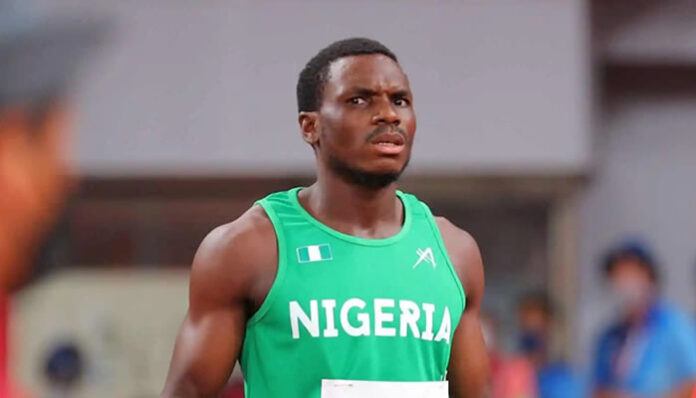In a brave and emotional revelation, Nigerian sprinter Divine Oduduru has opened up about the devastating impact of his six-year ban from athletics, describing a period of deep emotional turmoil that nearly cost him his life. The 28-year-old track star, whose career was once filled with promise and triumph, revealed the dark struggles he faced following the doping allegations that brought his sporting journey to a sudden halt.
Oduduru, who boasts personal bests of 9.86 seconds for the 100m and 19.73 seconds for the 200m, was banned from athletics in October 2023 by the Athletics Integrity Unit (AIU) for violating anti-doping regulations. Despite not testing positive for performance-enhancing drugs, Oduduru’s case was tied to that of Nigerian teammate Blessing Okagbare, who received an 11-year suspension for doping offenses in 2022. The AIU cited “overwhelming evidence” against Oduduru, accusing him of possession and attempted use of prohibited substances or methods.
But what followed was not just a battle for his reputation; it became a fight for his mental health. In an Instagram post earlier this week, Oduduru shared a deeply personal message with his fans, admitting the crushing toll the ban took on him. “Thanks to everyone, to my lovely fans who have been supporting me right from the beginning of my career,” he wrote. “I know a lot of you have been waiting to hear from me about the issue that happened. I have been quiet all this time due to my mental health.”
The sprinter then disclosed a shocking detail: during the months of silence, he had attempted suicide four times. “I attempted suicide four times, just wanted to end everything because all these things that happened are still a shock to me,” he admitted, his words laying bare the emotional and psychological cost of the scandal that shook his world.
The doping violations came as a huge blow to Oduduru, a sprinter who had once held great promise on the world stage. He had been widely regarded as one of Nigeria’s brightest athletic talents, with his outstanding performances at the NCAA level, where he was a four-time champion, and his role as a two-time Nigerian national champion. His personal bests in the 100m and 200m ranked him among the fastest men in the world.
Yet, despite these accolades, the ban marred his career, turning his dreams into a nightmare. For someone who had given so much to the sport, the accusations against him were a bitter betrayal of years of sacrifice. It is a sentiment that resonates with many Nigerian athletes who, like Oduduru, face the immense pressure of representing their country on the global stage, often only to have their hard work questioned.
But it wasn’t just the career loss that sent Oduduru into a downward spiral. The psychological strain of the ban left him in a state of deep distress. “After all these years of sacrifice, I will be granting interviews and I am working on coming live on Instagram to tell my side of what happened,” he promised, giving his followers hope that he would eventually clear his name and reveal his side of the story.
The athlete’s mental health struggles are not unique. The issue of mental health in sports, particularly among African athletes, has garnered increasing attention in recent years. The pressure to succeed, coupled with public scrutiny, can lead to devastating emotional consequences. Just last year, other athletes, such as American gymnast Simone Biles and tennis star Naomi Osaka, spoke out about their own battles with mental health, pushing for greater awareness and support systems within sports organizations.
For Oduduru, the public nature of the doping scandal only added to the weight he carried. “It’s still a shock to me,” he confessed, struggling to come to terms with the accusations. “Everything that has happened is so hard to accept.”
In the aftermath of his ban, Oduduru’s name has become linked to a broader conversation about doping in Nigerian athletics. His case serves as a reminder of the pitfalls that athletes can fall into, whether due to pressure, ignorance, or miscommunication. The accusations against him have led to heated discussions about the effectiveness of anti-doping measures and the ethics surrounding drug testing in athletics.
While Oduduru has not tested positive for banned substances, his involvement in the doping scandal has cast a long shadow over his career. The AIU’s assertion of “overwhelming evidence” against him underscores the gravity of the situation and highlights the intense scrutiny that athletes face. It is not the first time that Nigerian athletes have been embroiled in doping controversies, but Oduduru’s case is particularly poignant given his status as one of the country’s most celebrated sprinters.
The athlete has promised to provide more details about his case in the coming weeks, revealing what he describes as his side of the story. “I will be working on coming live on Instagram to tell my side of what happened,” he said, indicating that he intends to share a full account of his experiences and struggles with the public.
For now, the world watches as Oduduru works through the pain and attempts to reclaim his narrative. His mental health journey, however, will undoubtedly remain an integral part of his story. The sprinter’s decision to speak out marks a turning point in his fight for redemption—not just in the eyes of the public, but for his own peace of mind.
As Oduduru takes the first steps toward recovery, he has one message for his fans: “Thanks to everyone who has supported me. Your love and support mean the world to me.”

